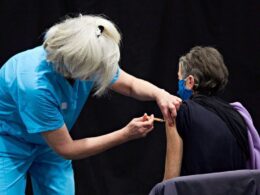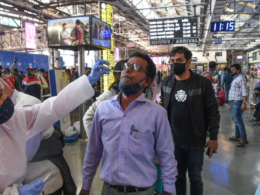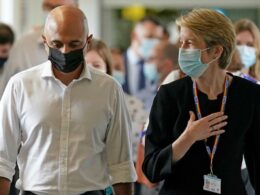Unless other vital public health measures are urgently introduced, the NHS will soon be overwhelmed
The Guardian
Chaand Nagpaul
Thu 16 Dec 2021
Dr Chaand Nagpaul is chair of the British Medical Association council
On Sunday evening’s extraordinary televised address, when the prime minister warned that Britain was facing a “ tidal wave “ of Omicron cases, it was notable that the only focus was the mission to vaccinate the nation with boosters.
There was no mention of the other vital public health measures needed to urgently reduce the levels of social mixing and prevent the NHS from being overwhelmed.
Given the reduced effectiveness of two vaccinations against the new Omicron variant, there is absolutely no doubt that the accelerated booster campaign is crucial to control the spread and impact of the virus — but we cannot rely on this alone.
The alarming pace with which it is spreading through the country, with a record of more than 78,000 new daily cases yesterday, shows the pressing need for additional effective infection control measures to be introduced immediately to protect the population.
Despite the assertion that all adults will be offered a booster by the end of December, millions of people will not be eligible for their booster by the end of the month — either because they aren’t vaccinated, have only had one jab, or received their second dose less than three months ago.
This group of people needs protection against Omicron until they too can get their booster jab. Many will be younger and more likely to mix socially, more likely to become infected and more likely to spread Covid-19.
Projections have suggested that the Omicron variant risks hospitalisation rates that could overwhelm the NHS at a time when it is already in a desperately precarious state.
We are facing a record backlog of waits for hospital treatments, escalating pressures on general practice, and are failing to meet emergency ambulance response targets. The sudden exponential rise in infections presents a major challenge. There is no slack in the system to accommodate any increase in Covid-19 hospital admissions, which will directly affect our ability to treat the nearly 6 million patients on waiting lists in England, with more than 300,000 having waited for longer than 12 months. Indeed, a recent report found 13,000 planned operations had been cancelled in a two-month period at 40 hospitals because of lack of capacity from increased hospital admissions.
Measures are urgently needed to slow the spread of the virus and prevent further additional strain being placed on the NHS, while we also deliver the enormous feat of the booster vaccination programme.
This is not a choice between health and the economy. We have seen from previous variants that not introducing timely interventions is counterproductive for businesses and employers if it allows Covid-19 to spread unfettered through the population, resulting in staff being off work due to sickness or self-isolation. Let us not forget that, earlier this year, staff absences due to high levels of transmission impaired many businesses from functioning. High levels of infection are also likely to disproportionately affect some population groups and exacerbate inequalities.
The measures outlined in the government’s plan B rules announced last week not only fall short of what is needed but are also inconsistent, with glaring omissions.
Vaccine passes will not do enough to stop the spread of Omicron, since they require only proof of double vaccination or a recent negative lateral flow test to gain entry to nightclubs and mass events such as football matches.
By the government’s own admission, two doses of the vaccine does not confer sufficient protection from the new variant.
Furthermore, the government has drawn a false equivalence between a negative lateral flow test and proof of vaccination.
This presents a clear public health risk, as vaccinated but infectious asymptomatic people will be able to mix at will with unvaccinated people with a negative lateral flow test.
Testing should be the minimum requirement for entry to all hospitality venues and, as the BMA has already argued, the government should be acting to significantly reduce large social gatherings.
- Requiring mask wearing in indoor settings but not in hospitality venues defies public health logic.
Staff in takeaways are rightly required to wear masks, yet waiters in restaurants taking orders in the direct line of customers’ faces, at close distance, are not.
- Customers should also be required to wear face coverings unless eating or drinking.

Air filtration devices, nature
The measures are not just confusing, but also undermine the public’s understanding of this virus and its high transmissibility.
- There is no requirement for social distancing in indoor public settings when it’s clear that this can reduce transmission.
- Rather than simply state that indoor settings should be adequately ventilated, there should be proper specifications, including the use of filtration devices and CO 2 monitors, which we know can make a difference to risk of transmission in enclosed areas.
In healthcare settings, we need to see
- the reintroduction of stronger infection control measures, with clear advice around the use of PPE and segregated care pathways.
Patients attend their GP practice or hospital to get better, not to be put at risk of getting ill from infection.
- Likewise, we need further guidance for schools, which have had the highest rates of infection since September, and where children have been a source of household transmission, with many not having been vaccinated at all.
This should include
- mask wearing in all places in secondary schools,
- reintroducing distancing, as well as ventilation — and if needed, government-supplied air filtration systems, given the proximity of pupils in classrooms.
By doing nothing there is a far greater threat to children’s learning through absenteeism and high levels of staff and student sickness and self-isolation.
For businesses in the hospitality sector, who will suffer loss of income as a result of these measures, it is important that the government provides necessary financial support.
As it stands, the country will incur the greater economic cost of the illness burden on the NHS and lost workforce capacity due to sickness.
- For patients at higher risk of serious ill health from the virus, such as those who are clinically vulnerable, they should be recommended FFP2 masks, given that they protect the wearer through being able to filtrate airborne spread — another simple measure which could have a huge positive impact for individuals.
Implementing these additional protections will prevent many more people from becoming ill, hospitalised or dying, and will help keep the NHS afloat at this critical moment.
Crucially, it will also buy us time to deliver this accelerated booster campaign and help get us on the front foot in the battle against Covid-19.
Originally published at https://www.theguardian.com on December 16, 2021.












